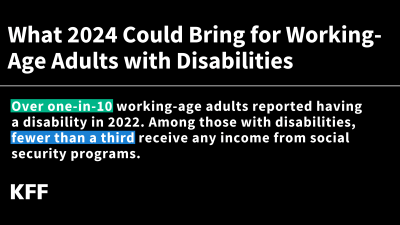 Working-Age Adults with Disabilities Living in the Community
Issue Brief
Working-Age Adults with Disabilities Living in the Community
Issue Brief
In September 2023, the National Institutes of Health designated people with disabilities as a population experiencing health disparities, which will help ensure that people with disabilities are represented in research funded by the National Institutes. Also in September of 2023, the Biden Administration proposed a new rule that would update the requirements for nondiscrimination on the basis of disability. Among other changes, the proposed rule would codify the Olmstead court decision, which requires people with disabilities to be served in the most integrated setting that is appropriate. The new designation and proposed rule may reflect, in part, an increased awareness of the challenges and health disparities faced by people with disabilities, many of which were exacerbated by the COVID-19 pandemic and its aftermath.
In this analysis, KFF examines the characteristics of people with disabilities who are living in the community from the American Community Survey.